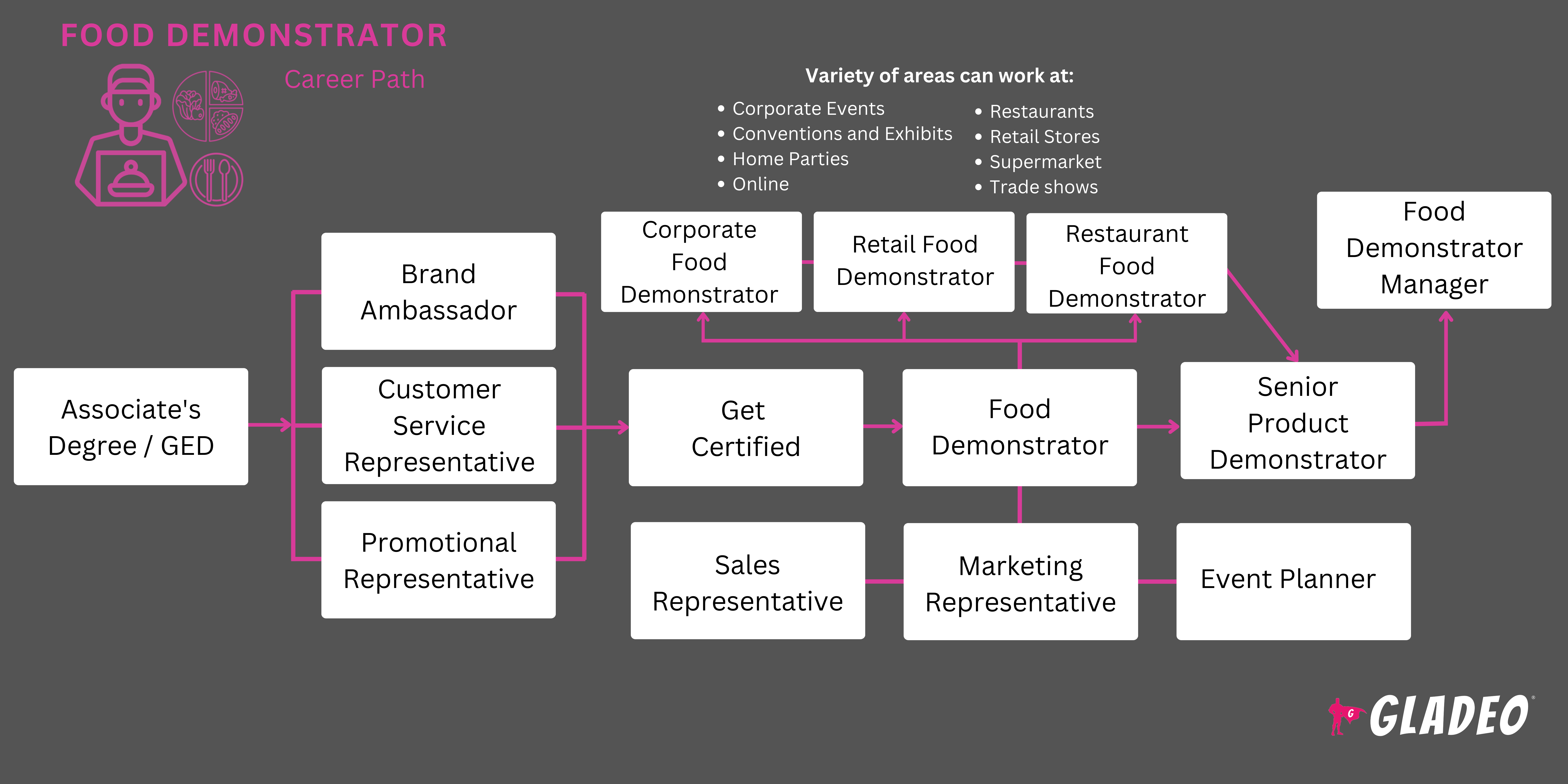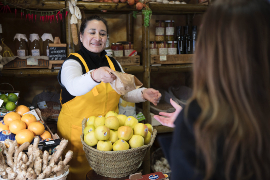Spotlights
Food Sample Demonstrator, Product Demonstrator, Brand Ambassador, In-store Demonstrator, Promotional Specialist, Food Sampling Coordinator, Culinary Demonstrator, Sales Demonstrator, Event Brand Ambassador, Retail Demonstrator, Food Show Presenter, Product Ambassador
We’ve all been to grocery stores and seen the endless aisles of products for sale. How do we know which ones we’ll like? And how do companies entice consumers to try and buy new products they’ve introduced? Food Demonstrators are, at least in part, the answer to both questions!
Food Demonstrators prepare and present products in a safe, appealing, and informative way to raise awareness and promote purchases. They discuss product details and benefits while engaging in friendly banter with customers willing to taste samples.
As crucial players in the culinary marketing landscape, they often provide consumers with their first direct experience of new products and recipes. In addition to working in grocery stores, they may also set up sampling tables at restaurants, retailers, deli counters, food expos, or wineries, offering potential patrons samples of dishes or drinks being promoted.
- Engaging with the public and helping them make food choices
- Contributing to increased sales and product awareness
- Enjoying a varied work environment, from grocery stores to food expos
Working Schedule
- Food Demonstrators often work part-time and may have shifts during weekdays, weekends, or evenings. Travel to different retail locations or event venues may be necessary.
Typical Duties
- Learn details and key selling points about the products and recipes to be promoted
- Outline the workflow for the intended presentation or demo. Create supply lists
- Rehearse presentations in advance (depending on the complexity)
Establish contact with venues where demonstrations will be done. Review plans, schedules, seating options (if applicable), and any special equipment needed - Procure any perishable goods and ensure suitable refrigeration is available
- Pack all items and travel to work sites. Set up and maintain clean, attractive product sampling stations such as tables, carts, or booths
- Bring sufficient samples and ingredients, seasoning, sauces, measuring cups, serving plates, bowls, drinking or sample-holder cups, plastic wrap, napkins, spoons, forks, knives, cutting boards, bain maries, toothpicks, waste baskets, trash bags, tablecloths, cleaning supplies, pen and paper, etc.
- Cook, prepare, plate, and serve food samples, following safe food handling protocols
- Use food preparation applications such as microwaves, skillets, fryers, knives, etc.
- Ensure availability of a power source and electrical extension cord, if needed for appliances
- Engage with store customers in a friendly manner and answer their questions
- Effectively convey key talking points as outlined in advance by marketers
- Maintain a clean and sterile station using cleaning products and chemicals, as needed. Clean up messes and remove trash items
- Collect customer feedback and report food demonstration results to marketing teams
- Offer product coupons or other information
Additional Responsibilities
- Maintain relations with staff at the hosting establishment
- Train new Food Demonstrators and assistants
- Present a positive, professional appearance and demeanor during demonstrations
- Tear down sampling stations and store or transport them
- Manage inventory. Turn in or dispose of unused samples. Complete expense reports
Soft Skills
- Customer service
- Effective communications
- Enthusiasm
- Independence
- Initiative
- Monitoring skills
- Motivation
- Organization
- Reliability
- Responsibility
- Safety consciousness
- Sales skills
- Sound judgment
- Stamina
- Time management
Technical Skills
- Food and beverage product knowledge
- Safe food handling and preparation to ensure food is stored, prepared, and served safely to prevent foodborne illnesses
- Allergen awareness
- Composting of food waste
- Setup and teardown of display areas, equipment, tables, carts, etc.
- Inventory management
- Sales techniques
- Sanitation practices
- Scheduling
- Use of electrical cooking appliances such as microwaves, skillets, and fryers
- Safe use of kitchen knives and serving utensils. Use of measuring cups and tools
- Operating motor vehicle
- Grocery stores
- Large retailers and wholesale outlets
- Malls
- Food expos and festivals
- Wineries
- Convenience stores
Food Demonstrators must have extensive knowledge of the products they showcase, including ingredients, potential allergens, and product benefits. But that’s only half of their role! They’re essentially salespeople, so they need to be engaging speakers who can get attention, get shoppers to try samples, and hopefully boost product purchases.
Food Demonstrators might work irregular shifts, including weekends, evenings, and holidays. It can be physically demanding at times because the job involves standing for long periods. Also, they may have to travel from one location to another, which means constantly packing and unpacking supplies, tearing down and setting up their tables, and moving around a lot. This requires planning and a commitment to sanitation and food safety, too.
Many jobs in this field are only part-time, seasonal, or temporary, so it may not be a viable option for everyone. In addition, there are limited opportunities for career growth. However, Food Demonstrators gain a ton of valuable, first-hand sales experience via frequent customer interaction—which can be rewarding on its own and beneficial for other careers in sales and marketing!
In the food demonstration industry, there is a noticeable shift towards promoting products that cater to healthier lifestyles. Sustainability is also a hot topic with more focus on products made using sustainable practices or that feature eco-friendly packaging.
Another trend is that Food Demonstrators are using tablets and other devices to engage customers and provide more product information. In fact, there’s an overall push to make demonstrations more like interactive, personalized experiences that can better drive sales.
Many Food Demonstrators have a lifelong passion for cooking or baking, often sparked by family traditions. They may love social interaction and meeting new people. Backgrounds in retail, sales, or performing arts can also lead naturally into the role.
- Food Demonstrators usually need a high school diploma or GED certificate, though some may get started while still in high school
- Depending on the food or drink being demonstrated, workers may need knowledge of nutrition, safe food preparation, basic cooking, use of small cooking appliances and kitchen tools, and sanitation procedures
- Additional qualifications may include a safe food handling certification or a National Restaurant Association ServSafe card. Criteria may vary from state to state
- Those working with alcoholic beverages will need to be at least 21 years old and may need additional training and certification
- Prior experience in sales or customer service roles is very helpful. Public speaking or presentation courses can also be useful
- Employers should provide basic On-the-Job training, often with the marketing team and another Food Demonstrator that you’ll assist and learn from
- Food Demonstrators don’t require a degree, but many community colleges offer safe food handling certification programs as well as suitable courses such as cooking, food preparation, sales, public speaking, and more.
- Consider the availability of financial aid and scholarships!
- Focus on courses in cooking, marketing, and public speaking
- Get a food handler’s certificate. Volunteer or get a part-time job working at events where food items are sold
- Go to stores where Food Demonstrators are working. Watch them and try to strike up a conversation when they don’t have a lot of customers
- Watch videos and read blogs about how to present a successful food demonstration
- Get your driver’s license and maintain a clean driving record
- Be prepared for a potential background check
- Keep your resume current and add relevant experience, certifications, and educational achievements as you complete them
- Ask potential professional references for permission to give out their contact information

- Once you’ve acquired basic culinary and sales skills plus a safe food handling certification (if required), it’s time to look for jobs!
- Check out job ads on portals such as Indeed, Glassdoor, Zippia, or even Craigslist
- Screen job ads carefully. Note applicable keywords to use in your resume, such as:
- Customer engagement
- Food safety
- Interpersonal communication
- Inventory management
- Marketing
- Presentation skills
- Product demonstration
- Product knowledge
- Sales techniques
- Review Food Demonstrator resume templates for formatting ideas
- Reach out to working Food Demonstrators to ask for job-seeking tips
- Search online to find common interview questions to expect, then practice doing mock interviews with friends
- Dress appropriately for job interviews and show off your enthusiasm for the job!
- Consider knocking out additional certifications, training, or perhaps even a degree!
- Talk with your supervisor or manager about professional development and how you might advance with the company
Offer to take on extra duties such as overseeing other demonstrators - Gain additional experience in sales and marketing within the food industry
- Stay up-to-date on relevant changes in safe food handling guidelines
- Study manufacturer and software guides for related equipment or software used for demonstrations
- Keep learning new things from seasoned pros
- Train other Food Demonstrators thoroughly and set an example for them to follow
- Small businesses may have limited opportunities for advancement. To move up, you may have to apply to larger organizations at some point
- Be active in professional organizations and groups that apply to your area of expertise
Websites
- Academy of Nutrition and Dietetics
- Association of Nutrition and Foodservice Professionals
- National Association for Retail Marketing Services
- National Restaurant Association
- Promotional Marketing Association
Books
- An Essential Guide To Party Food: The Ultimate Handbook for Delectable Party Delights: Unleash Your Culinary Creativity and Dazzle Guests, by Adeline Crossley
- Food Presentation Secrets: Styling Techniques of Professionals, by Cara Hobday and Jo Denbury
- Working The Plate: The Art of Food Presentation, by Christopher Styler
Being a Food Demonstrator can be a fun and rewarding career, but there’s not always room for promotions and long-term career advancement. If you’re curious about other food and sales-related career options, check out the suggested job titles below!
- Baker
- Bartender
- Butcher
- Cake Decorator
- Catering Manager
- Chef
- Flight Attendant
- Food Service Manager
- Host and Hostess
- Line Cook
- Marketing Coordinator
- Pastry Chef
- Prep Cook
- Retail Sales Worker
- Sommelier
- Sous Chef
- Sushi Chef
- Wait Staff
Newsfeed

Featured Jobs

Online Courses and Tools

Annual Salary Expectations
New workers start around $29K. Median pay is $33K per year. Highly experienced workers can earn around $37K.






